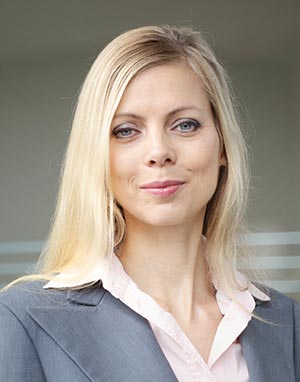 Originally published in the 2016 edition of Innovation magazine
Originally published in the 2016 edition of Innovation magazine
By Amy Raley, Purdue Marketing and Media
In 2009, President Barack Obama removed the locks from what today amounts to more than 190,000 data sets at data.gov, giving the public free access to the data as part of the “Transparent and Open Government” initiative. The data covers agriculture, business, energy, health and public safety, among others.
Purdue Polytechnic’s Sabine Brunswicker, an internationally recognized authority on open innovation, understands the highly complex challenges that stand in the way of using the data to solve societal problems or generate life-enhancing tools. Supported in part by a National Science Foundation grant, she is leading research that will develop novel contest strategies that encourage crowds of individuals with wide-ranging abilities and expertise to solve problems with apps using open data.
“We need to find mechanisms to incentivize crowds and individuals to turn this data into something useful,” says Brunswicker, associate professor of innovation and director of the Purdue Research Center for Open Digital Innovation.
 One example of open-data software that Brunswicker cites is the web-based “Adopt-a-Hydrant” app that facilitates fire-hydrant snow removal by citizens in Boston, Massachusetts. “They used open data that showed the locations of fire hydrants to the public, who then ‘adopt’ hydrants and take responsibility to take the snow away,” Brunswicker says. “This little app became viral and saved the city money. It’s one small story about how an open application can solve problems.”
One example of open-data software that Brunswicker cites is the web-based “Adopt-a-Hydrant” app that facilitates fire-hydrant snow removal by citizens in Boston, Massachusetts. “They used open data that showed the locations of fire hydrants to the public, who then ‘adopt’ hydrants and take responsibility to take the snow away,” Brunswicker says. “This little app became viral and saved the city money. It’s one small story about how an open application can solve problems.”
Brunswicker also facilitates the Purdue “Ironhacks” competition, which is different from typical two- or three-day hackathons, in that participants can consult with experts and improve their apps over time.
“To make real-world impact, the apps should actually be used,” Brunswicker says. “On the one hand, we want to develop the best algorithms, but we also hope our apps are used in the real world.”
One such real-world app that won the first Purdue Ironhacks competition will soon make an impact on the area surrounding Purdue. “It uses open crime data, flood data, rent costs, et cetera, to give students looking for housing a quick overview of information to help them decide where they should rent,” Brunswicker says. The app is operating as a prototype now.
If you come across a contest entry that challenges you to compete in a code-writing contest, chances are good Brunswicker will have had something to do with it. “The government has opened its innovation processes. And we now must involve citizens to help solve problems.”
For more information on Brunswicker’s work, visit the Research Center for Open Digital Innovation.
